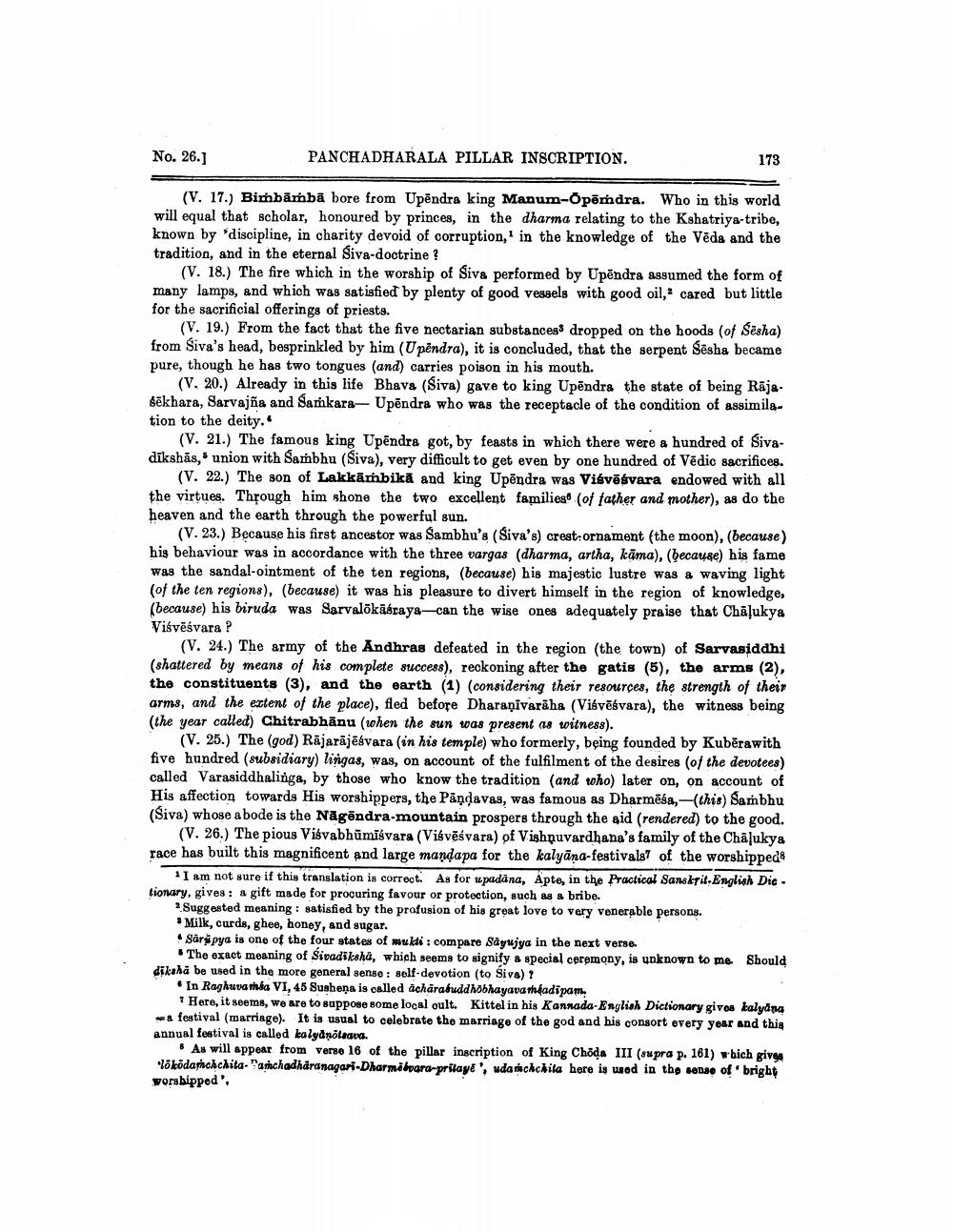________________
No. 26.]
PANCHADHARALA PILLAR INSCRIPTION.
(V. 17.) Bimbamba bore from Upendra king Manum-Opemdra. Who in this world will equal that scholar, honoured by princes, in the dharma relating to the Kshatriya-tribe, known by 'discipline, in charity devoid of corruption, in the knowledge of the Veda and the tradition, and in the eternal Siva-doctrine ?
173
(V. 18.) The fire which in the worship of Siva performed by Upendra assumed the form of many lamps, and which was satisfied by plenty of good vessels with good oil, cared but little for the sacrificial offerings of priests.
(V. 19.) From the fact that the five nectarian substancess dropped on the hoods (of Sesha) from Siva's head, besprinkled by him (Upendra), it is concluded, that the serpent Sesha became pure, though he has two tongues (and) carries poison in his mouth.
(V. 20.) Already in this life Bhava (Siva) gave to king Upendra the state of being Rajasekhara, Sarvajña and Samkara- Upendra who was the receptacle of the condition of assimilation to the deity."
(V. 21.) The famous king Upendra got, by feasts in which there were a hundred of Sivadikshas, union with Sambhu (Siva), very difficult to get even by one hundred of Vedic sacrifices.
(V. 22.) The son of Lakkambika and king Upendra was Visvesvara endowed with all the virtues. Through him shone the two excellent families (of father and mother), as do the heaven and the earth through the powerful sun.
(V. 23.) Because his first ancestor was Sambhu's (Siva's) crest ornament (the moon), (because) his behaviour was in accordance with the three vargas (dharma, artha, kama), (because) his fame was the sandal-ointment of the ten regions, (because) his majestic lustre was a waving light (of the ten regions), (because) it was his pleasure to divert himself in the region of knowledge, (because) his biruda was Sarvalōkāáraya-can the wise ones adequately praise that Chalukya
Viśvēśvara ?
(V. 24.) The army of the Andhras defeated in the region (the town) of Sarvasiddhi (shattered by means of his complete success), reckoning after the gatis (5), the arms (2), the constituents (3), and the earth (1) (considering their resources, the strength of their arms, and the extent of the place), fled before Dharanivaraha (Viśvēśvara), the witness being (the year called) Chitrabhanu (when the sun was present as witness).
(V. 25.) The (god) Rajarājēśvara (in his temple) who formerly, being founded by Kuberawith five hundred (subsidiary) lingas, was, on account of the fulfilment of the desires (of the devotees) called Varasiddhalinga, by those who know the tradition (and who) later on, on account of His affection towards His worshippers, the Pandavas, was famous as Dharmesa,-(this) Sambhu (Siva) whose abode is the Nagendra-mountain prospers through the aid (rendered) to the good.
(V. 26.) The pious Viśvabhumisvara (Visvesvara) of Vishnuvardhana's family of the Chalukya race has built this magnificent and large mandapa for the kalyana-festivals of the worshippeds
I am not sure if this translation is correct. As for upadana, Apte, in the Practical Sanskrit-English Dic tionary, gives: a gift made for procuring favour or protection, such as a bribe.
2 Suggested meaning: satisfied by the profusion of his great love to very venerable persons.
Milk, curds, ghee, honey, and sugar.
Sär pya is one of the four states of multi: compare Sayujya in the next verse.
The exact meaning of Sivadiksha, which seems to signify a special ceremony, is unknown to me. Should diksha be used in the more general sense: self-devotion (to Siva)?
In Raghuvamia VI, 45 Susheņa is called ächärabuddhobhayava méadipam
Here, it seems, we are to suppose some local cult. Kittel in his Kannada-English Dictionary gives kalyana
a festival (marriage). It is usual to celebrate the marriage of the god and his consort every year and this annual festival is called kalyanotsava.
As will appear from verse 16 of the pillar inscription of King Chōda III (supra p. 161) which gives löködamchchita-amchadharanagari-Dharmavara-pritage', udamchchita here is used in the sense of 'bright
worshipped',




